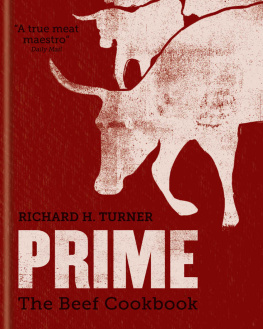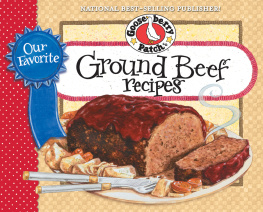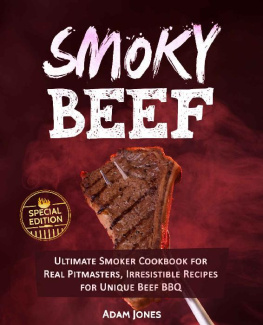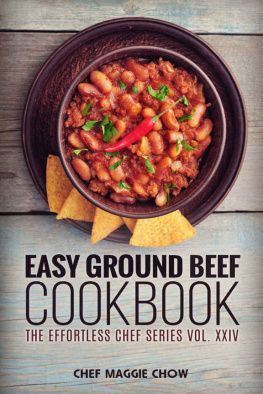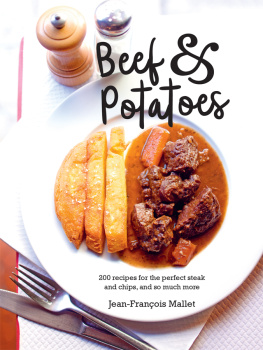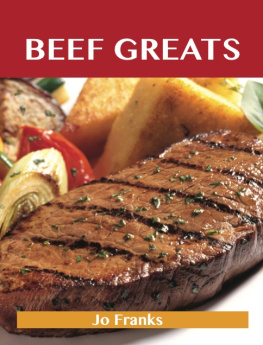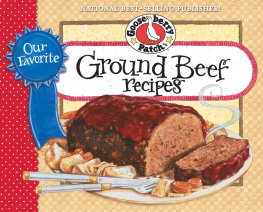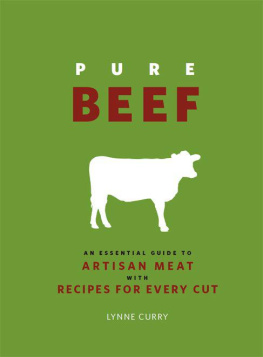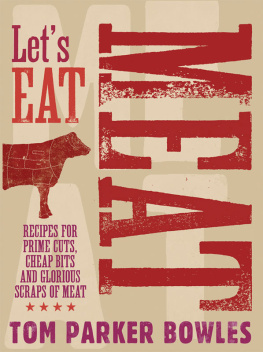Dedication
I dedicate this book to the late, great Joshua Ozersky, my friend and partner in Meatopia, who inspired me to write, and wrote the foreword to the resulting book Hog. He is profoundly missed.
It turns out writing is not as easy as I once thought; it really is a craft, and Joshs prose is where I turn when I need to be inspired in my own stumbling efforts. He wrote this:
As a food writer, I am handicapped by gross deficiencies. Ive never worked in a restaurant or gone to cooking school, and am utterly ignorant of whole cuisines, but no man feels food moredeeply. Its my whole life, and my connection to it is wildly, shamefully emotional: I live it, and that bone-deep obsession powers my work. That honesty, unwholesome though it may be, fixes my view and grants me the kind of zeal and rancor that makes writing about roast beef meaningful.
When I started to write about food my voice led me through my dark places. It makes my work good, or at least honest, and honest is enough.
Joshua Ozersky 19672015


Tap to buy now
Contents
How to use this ebook
Select one of the chapters from the and you will be taken to a list of all the recipes covered in that chapter.
Alternatively, jump to the to browse recipes by ingredient.
Look out for linked text (which is blue) throughout the ebook that you can select to help you navigate between related recipes.
Foreword by Mark Schatzker
Eating is a funny thing. The desire for food to be at its most delicious is universal. And yet, the food we often eat is far from that ideal. Its all thanks to the human mouth.
On the one hand, you need a mouth in order to eat that much is obvious. But when meals end, we begin using our mouths for something else: talking. This is where things often go wrong.
We get hung up on words. For example, we get obsessed with places. Every ten years or so, some new place pops into vogue, and within a week it seems every chef is doing his own take on some obscure regional recipe, particularly, it seems, chefs who have never visited that area. We also become fixated on techniques. A few years ago, there was a spell of several months where no one who knew anything about food wanted to eat anything that wasnt cooked in a plastic bag.
Theres nothing inherently wrong with places or techniques. But they are not, in themselves, a silver bullet conferring deliciousness on a sauce, a dish, or a meal. In our enthusiasm for good food, we get lost in concepts and very often end up making food bad. There are, however, a vanguard of chefs who measure food by a simple but all important metric: the way it tastes. Richard Turner is one. Hes not a traditionalist there are recipes in this book for Kimchi Hash, West African Suya and Burmese Beef Curry. But hes not taken in by the food worlds frequent bouts of silliness. He just loves food. And he wants other people to love the food he loves, and for the same reason.
Which brings us to beef, the king of all meats. The bedrock protein. The eternal object of our primordial meat hunger. When a boneless breast of chicken looks in the mirror, it wishes it was beef. All of which makes todays sorry state of beef all the more perplexing.
Over the past several decades, we have engineered our agricultural system to produce beef at the lowest possible price. Beef today is cheap. Its amazing to consider that you can walk into a supermarket and buy a rib eye steak a vanishingly scarce piece of carcass for a few pounds or dollars. But its lost the one thing that made it so desirable in the first place: flavour. So we do to beef what we do to boneless chicken breast we smother it in sauces and rubs and marinades.
To any beef lover, loving beef has become inordinately difficult. Its as though red meat has lost its voice.
I wrote an entire book about what happened to beef. When it came out, I started hearing from all sorts of chefs, most of whom would write to tell me that they had cracked the mystery of the perfect rub (it would invariably involve powdered soup mix), or magical marinade (which was actually a salad dressing), or the perfect ratio of brisket to chuck in a burger grind (which makes no sense, because no two briskets and chucks are alike). And then I heard from Richard Turner, who worshipped at the same altar of simplicity. A good steak, he said, needed two things: fire and salt.
If you love beef, listen to Richard Turner. Listen to what he says about what kind of cows you should eat, what those cows should eat, the kinds of lives they should live, how they should be killed, cut, and, finally, cooked. Take a morsel of that beef that Smoked Prime Rib, that scrap of Pickled Tripe, that slug of Beef Heart Tea and put it in the place it was destined for: your mouth. More eating, less talking. Its the way food was meant to be.

Mark Schatzker, 2017

Introduction
When meat cravings hit, more often than not what springs to mind is beef and specifically steak. Its the embodiment of premium meat, the most expensive thing on the menu. There are restaurants devoted solely to beef dimly lit and decorated in leather and dark wood, steakhouses are temples to our carnivorous voracity. As well as its own restaurant genre, beef has its own piece of cutlery: the steak knife, large, imposing and Ramboesque. Steakhouses might show you the meat raw, carried out to diners on a tray with various chunks of dark red flesh for us to point at. That one we might say; its all very primal. Prime is about beef and steak: why its special and what it takes to make this king of meat great.
In this book, Ive explained what it takes to grill the perfect steak, roast the perfect joint and make the perfect burger, as well as the different ways to get the best out of the cuts and in some cases breeds. These are guidelines rather than rules. If you have read the book, you will hopefully be using a nice piece of extensively farmed pure-bred native beef, and youll understand that uniformity is not one of its many excellent qualities. Ive put together some 160 or so recipes, some classics from around the world and some unique recipes from my notebook. As a rule of thumb, 1kg (about 2lb) of beef feeds four to six people, but Im not the meat police, so I am really leaving it up to you.
Between the recipe chapters, I will also highlight the shortcuts most farmers are pressurized into taking, at great cost to our palates and even to our health. In a destructive cycle, our meat lust fuels intensive farming, which in turn makes it cheap to buy and encourages excessive meat consumption. It is a cycle that benefits no one, including the farmers forced to sell meat so cheaply that their sales barely cover their costs. Its not good for our own health, nor for the health of the animals we farm.
There is a lot of scaremongering in the media about meat eating, and consumption of meat has been linked to obesity, diabetes, heart disease and certain cancers. Since much of the meat eaten around the world is intensively farmed, and since these scare stories dont differentiate between intensively farmed and naturally reared meat, this is an understandable mistake. In the chapter on health I make the case for judicious consumption of naturally reared, high-quality beef, as part of a healthy, balanced diet.

